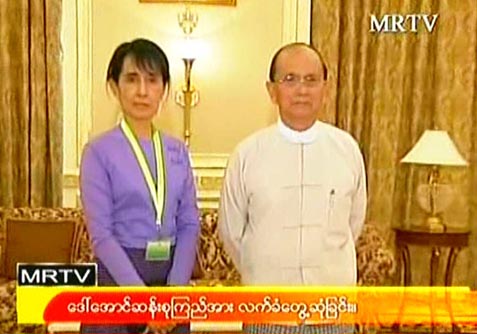(Commentary) – Burma’s President Thein Sein would be wise to consider the lesson former Soviet President Mikhail Gorbachev learned the hard way.
Burma under President Thein Sein faces ethnic and political pressures as well as economic failure after over two decades of the ruling generals’ cronyism and limited market economy without political liberalization. At the same time, Burma’s new leader is under pressure to bring in positive changes and address the expectations from his newly elected government.
 Two decades ago, Soviet General-Secretary Gorbachev found his bold perestroika programme had failed to deliver significant economic improvement, and the elimination of political and social control released latent ethnic and national tensions in the Baltic states and in the republics of Armenia, Georgia, Ukraine and Moldova. Gorbachev was torn. He appeared to be mollifying remaining hardliners, who were disgruntled over the deterioration of the Soviet Empire and increasing marginalization of the Communist party, while at the same time trying to open up the country.
Two decades ago, Soviet General-Secretary Gorbachev found his bold perestroika programme had failed to deliver significant economic improvement, and the elimination of political and social control released latent ethnic and national tensions in the Baltic states and in the republics of Armenia, Georgia, Ukraine and Moldova. Gorbachev was torn. He appeared to be mollifying remaining hardliners, who were disgruntled over the deterioration of the Soviet Empire and increasing marginalization of the Communist party, while at the same time trying to open up the country.
As it turned out, Gorbachev won the 1990 Nobel Peace Prize and international acclaim but lost the Soviet Empire.
Today, Burma is teetering on the brink of change in many ways similar to the last days of the Soviet Union. Burma faces the push and pull of democratic forces and an entrenched power structure, as well as tensions in the ethnic states.
In simple terms, Burma’s new president is not very different from Gorbachev, as he is one of the generals from the previous suppressive military power structure.
During his first presidential speech on March 31, 2011, Thein Sein noted that the first five-year term is the most important in terms of building a modern, developed, democratic nation.
“If we take giant steps, the nation will have a prosperous future,” he said. “To achieve this goal, the government must be a clean one with good governance. In addition, the government must have good management and administrative skills and show a benevolent attitude towards the people. And it must safeguard and serve the public interests. To be a clean government, we must abstain from corruption and bribery, which tarnishes the image of the nation and the people.”
Burma’s new president has declared war on corruption. This will not be that easy. One only has to look at Gorbachev and how Soviet hardliners blocked his policy and protected their interests.
Shifting power from a one-man-show under former dictator General Than Shwe to a so-called elected system could cause more problems than under the previous military regime—yet the previous regime has set up a 100 per cent worry-free political system for their transitional government and own safety, including dirty tricks and an appropriate constitutional framework.
President Thein Sein appears to have moved forward, surprising some observers who did not expect him to go this far. Former Thai Foreign Minister Kasit Piromya who met him in Burma in 2010, when the president was the selected prime minister, noted his gentlemanly style and willingness to be open in his discussions. Burmese regime associates say he has been cautious and observing during his first 100 days in office, noting he not only listened to people close to him but expected views from a range of different people.
As one Burmese political observer said, it is necessary to wait and see whether things will change under his management, noting he has a long way to go and it will be hard to change the “warlords” within his ruling government and party.
No doubt, President Thein Sein has to make slow moves and be cautious about his former bosses and his watchers in government and the military elite. But the economic downturn and mismanagement is pushing him to move faster and therefore he needs help from the other camp.
Perhaps that is why he has picked Aung San Suu Kyi to deal with the international community and general problems in the disaster zone.
Twenty years ago, President Mikhail Gorbachev presided over the collapse of the Soviet Union, under the shadow of US President Ronald Reagan and the threat of his Star Wars programme, providing a new dawn for Russians and its former states.



